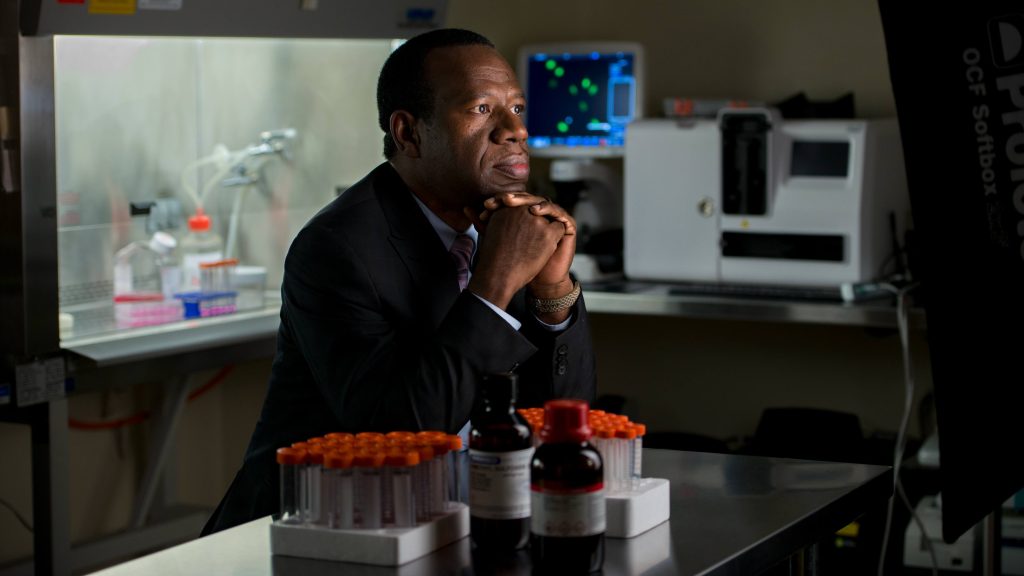
Cancer, stroke, bone loss among diseases and conditions studied in microgravity
JACKSONVILLE, Florida - Mayo Clinic physician and researcher Dr. Abba Zubair's work combines two passions - medicine and space - for the benefit of astronauts and people on Earth. His research in space is yielding discoveries in cancer, stroke, bone loss and more. In this expert alert, Dr. Zubair answers five questions about his studies in microgravity.
What are you hoping to accomplish through your research?
"The goal is to harness the uniqueness of the space environment for the betterment of humanity, be it on Earth or in space," Dr. Zubair says."We wanted to take advantage of the environment at the International Space Station to study how it affects human physiology."
The absence of gravity and the impacts of radiation and vacuum are three fundamental aspects of the uniqueness of space, adds Dr. Zubair, who has sent three research projects to the International Space Station (ISS) since 2017, with more to come.
As a regenerative biotherapeutics specialist, Dr. Zubair's work focuses in part on adult stem cells - known as mesenchymal stem cells -and their use in future treatments for stroke. He noted that he uses stem cells in regenerative medicine and in supporting Mayo's bone marrow transplant program.
"I also know how challenging it is to grow them in the lab. One of the first fundamentals is to see how the absence of gravity influences how stem cells divide and the growth rate," Dr. Zubair explains. "We wanted to see whether cells grown in space are any better or grow faster than cells grown in the lab. When we did our first space flight, we had a really interesting finding, because we realized that the absence of gravity affects stem cells, but it depends on the type of stem cells."
That led Dr. Zubair to another project on the ISS: studying how mesenchymal stem cells, the precursor for bone-forming cells, play a role in bone formation or osteoporosis, bone loss. He notes that astronauts tend to lose bone density despite rigorous exercise.
How might your research benefit people with cancer?
Dr. Zubair is also studying how leukemia stem cells, the cells that form the seed of this blood cancer, respond to the space environment.
"We are also working to understand the impact of space radiation, from the angle of how we can mitigate the effect of radiation and prevent cancer," Dr. Zubair says. "In the long run, we really want to protect astronauts, especially during long-term space travel, such as to Mars, where they would be deep in space and away from any magnetic field protection that we get from Earth."
The research also may benefit people on Earth by revealing how to protect stem cells or cells in general when there is radiation exposure, such as nuclear accidents, he adds.
In addition, Dr. Zubair's space research could have implications for CAR-T treatment, bone marrow transplants or other therapies for cancer patients.
"If we can understand how stem cells in space, especially hematopoietic stem cells (cells that live in the bone marrow and produce cells that function in the blood), expand and differentiate to make immune cells like T cells, microphages, we will learn how to make them more efficiently," Dr. Zubair says.
You've remarked that you can envision a time when people might go into space to receive certain medical treatments. How would that work, and might it be possible to simulate microgravity for those treatments on Earth?
If cells proliferate more in space, for example if cancer cells go into what is called cell cycle and multiply abnormally when they proliferate, then chemotherapy will be more effective, Dr. Zubair says.
"If that is the case, that absence of gravity can induce leukemia cells or other cancer cells to go into cell cycle, that makes them susceptible to chemotherapy," he explains. "So instead of giving the chemo on Earth, you might go into space where the absence of gravity makes the cancer cells more vulnerable to chemotherapy. That would be one more reason to go to space. That is definitely something that I would love to explore."
It would be difficult to create a comparable microgravity environment on Earth, but technically, it could be done, Dr. Zubair adds.






